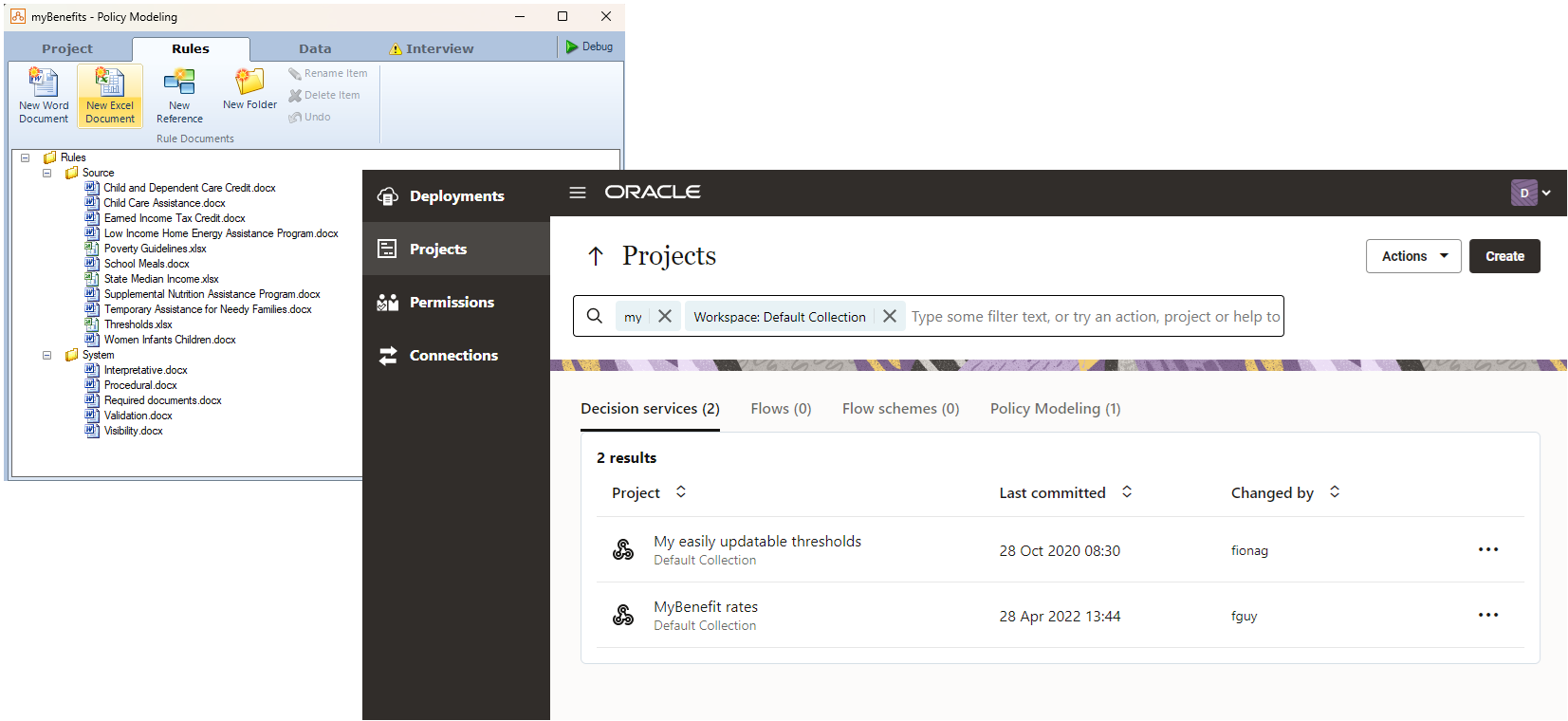Premier support for Intelligent Advisor on-premises, formerly known as Oracle Policy Automation, ends in September 2025. Learn how to make the move to Intelligent Advisor Cloud Service so you can take advantage of all the great benefits it delivers.
Background
For more than 20 years, governments, banks and other enterprises around the world have become more agile by adopting Intelligent Advisor to give accurate and auditable advice and decisions. Since 2015 both on-premises and cloud editions of Intelligent Advisor have been available.
After September 2025, Oracle Premier Support will end for on-premises Intelligent Advisor. If your organization is using the on-premises products – purchased as Oracle Policy Automation for running rules and interviews and Oracle Policy Modeling for desktop based authoring of those rules – you might be wondering what this means for you. This article explains the benefits of moving your existing investment to the cloud edition of Oracle Intelligent Advisor and gives an overview of what’s involved in doing so.
A brief history of Intelligent Advisor
Since version 12.1 of Intelligent Advisor was released back in 2015 the cloud and on-premises editions of Intelligent Advisor (then still known as Oracle Policy Automation) have been nearly identical:
- The same desktop Oracle Policy Modeling authoring tool is used to author rules and interviews
- The same Intelligent Advisor Hub is used to manage the lifecycle of those projects
- The same interviews and REST APIs are used to run and integrate interviews and rules with Oracle CX and any other enterprise applications
A few years ago, Oracle Policy Automation changed its name to Oracle Intelligent Advisor. This was just a name change: the cloud and on-premises product remain the same and continue to evolve together. A new 12.2.x version is shipped every quarter for both editions. For example the May 2024 “24B” release has the version number 12.2.35.

Image: The same Intelligent Advisor Hub and Oracle Policy Modeling experiences are provided for both on-premises and cloud editions of Intelligent Advisor.
What is Intelligent Advisor Cloud Service?
Intelligent Advisor Cloud Service is just like the on-premises product in almost every way, but brings the following unique benefits:
- No need to purchase and maintain infrastructure, database or application server software on which to run Intelligent Advisor
- Automatic updates to the latest Intelligent Advisor release every quarter, with zero downtime
- Support for 12 regions around the world, with global regulatory compliance with programs such as FedRamp and built-in disaster recovery
- Experience maximum speed from Intelligent Advisor with every environment tuned to meet the usage patterns of customers
Many on-premises customers have already made the switch from on-premises to cloud Intelligent Advisor, and haven’t looked back. New features every quarter, high performance, reliable operation and responsive support to help with any issues that arise are all hallmarks of the customer experience with Intelligent Advisor Cloud Service. Some more recent features are only available in the cloud edition.
How to make the move to the Cloud edition
The first step is simple. Reach out to your Oracle partner or your Oracle application sales representative to start a discussion. They will help you through engaging the right resources to answer questions like the following:
- How do I move my Intelligent Advisor projects to the cloud?
- In most cases, existing Intelligent Advisor 12.x projects can continue to be used without any changes
- The process of moving projects and Intelligent Advisor Hub configurations from on-premises to the cloud can be automated with REST APIs
- Will my existing integrations with Intelligent Advisor continue to work the same, or will changes be needed?
- All SOAP APIs, REST APIs, and Interview integration patterns are the same in the on-premises and cloud editions
- Some on-premises implementations have used the Java Engine APIs which aren’t available directly in the Cloud edition. Customers can migrate to the Batch REST API and discuss other options with Oracle experts
- Which on-premises products can I shelve?
- On-premises licenses for Oracle Policy Automation and Oracle Policy Modeling will no longer be needed
- Fewer licenses may be required for Oracle Database, Oracle WebLogic and other software
- What other costs can I save?
- Eliminate the cost of running and maintaining the infrastructure for Intelligent Advisor, including power, monitoring and patching
- Most Intelligent Advisor on-premises customers adopt an infrequent upgrade cycle that requires high levels of manual testing. The cloud edition eliminates the need for pre-update testing with a customer-selectable compatibility mode in the unlikely event of any post-update issues
What happens when Premier Support ends?
You can continue to run the on-premises product for as long as you need to. Beyond September 2025 when Premier Support ends there will no longer be new features or bug fixes for the on-premises edition of Intelligent Advisor. Beyond that date you can continue to take advantage of Oracle Support to raise support tickets for assistance, download existing product versions, access knowledge base articles, ask questions in the Oracle Customer Connect community etc.
There will be no new on-premises versions of Intelligent Advisor beyond September 2025.
Learn more
Oracle Customer Connect members can view the recording of the live webcast on this topic.
Become a member of Oracle Cloud Customer Connect | Events FAQ
Next steps
For on-premises customers that want to continue to manage rules and policies in a business-friendly and auditable way, and to easily update advice experiences and scalable decision-making across all channels, Oracle recommends reaching out to your Oracle partner or sales account representative today. Start the discussion about making the switch to Intelligent Advisor cloud edition, and you are likely to discover you can achieve the same outcomes more cost-effectively by moving to the cloud.
